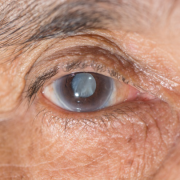Probably the most feared condition associated with aging is Alzheimer’s Disease or other dementias. This is understandable, because while research is moving forward, there is no straightforward treatment that always works to slow or stop its progression. Patients fear the loss of their independence, their memories and, to a large extent, their personalities.
Dementia can also cause a crisis in the family of the affected person because of the decisions that must be made in relation to both finances and care-giving.
However, in an ongoing study presented at the Alzheimer’s Association International Conference (AAIC) in 2014 by investigators at Case Western University in Cleveland, Ohio seems to indicate that dementia patients can benefit from at least one avenue of intervention, that of immediately removing visually significant cataracts.
Cataracts, which cause clouding of the natural crystalline lens inside the eye, are also associated with the aging process and are found in almost all people over the age of 70. Further, cataract extraction surgery (CES) is widely held to be one of the safest and most effective surgeries available today and is almost routinely offered once vision begins to be compromised. CES itself takes only minutes to perform from start to finish, and is associated only rarely with any complications; most patients experience improved vision right away.
There is no question that CES in healthy patients improves the quality of life by improving vision and clarity. Because cataracts are found in the great majority of people, they are considered to be a comorbid condition with Alzheimer’s Disease (AD) and other dementias. (Comorbid is a medical term meaning that it is found to be present at the same time, but that there is no causal factor involved.)
However, CES is usually not offered when found in AD patients. There is reluctance among primary care physicians, families and caregivers and even in ocular surgeons to remove cataracts in dementia patients simply because of the dementia. Families often want to avoid “putting their loved ones through it,” not realizing that CES has progressed to the point of not causing a significant amount of stress on patients at all in the great majority of cases.
Beneficial to Both Patient and Caregiver
Using MMSE (Mini-Mental State Examination) test score as their yardstick, investigators divided a cohort of patients with dementia and visually significant cataracts into two groups: one in which immediate CES was done and the other in which CES was delayed.
Those patients who received immediate CES maintained their MMSE scores, where the group whose surgeries were delayed showed a 2.5-point decrease; “This is as big, or bigger, than we see with any of the Alzheimer’s Disease drug trials,” principal investigator Alan J. Lerner, MD, Director and a staff neurologist at Case Western remarked.
“The clinical issue is that patients may not be getting CES simply because they have dementia,” he continued. “Even doctors will often not recommend it.”
All patients were evaluated at the beginning of the study, before surgery and again 6 months later. From a cognitive standpoint, the study population was “quite impaired,” as shown with MMSE scores, as well as the Neuropsychiatric Inventory (NPI). Interestingly, caregiver stress was also measured by NPI-Distress.
Analysis revealed that all patients who had immediate CES showed significantly improved vision, as expected. These patients also showed a slight increase in MMSE scores, while the others declined an average of 2.31 points. Caregiver stress decreased as well.
“One of the most striking things to me was the reduction in neuropsychiatric symptoms in patients and reduced caregiver burden and stress,” said Dr. Lerner.
Historically, there has been a reluctance to intervene in dementia patients with comorbid illnesses and conditions, such as cataracts. But it makes sense to remove rocks in the path when possible, especially since CES is both safe and successful about 98% of the time.
Cataracts form a kind of sensory barrier to vision, which can be associated with hallucinations, anxiety and other psychiatric symptoms. Removing them not only improves vision but improves quality of life and reduces social isolation, all worthwhile goals of intervention.
This study implies that treatment of accompanying conditions like cataracts needs to be somewhat more aggressive in dementia patients; if the dementia is the only reason CES is not offered, that needs to change. It has been shown in other studies that brain-stimulating activities such as doing crossword puzzles and playing video games seem to delay onset and progression in AD. Improvement of vision and quality of life by removing cataracts is almost a “slam-dunk.”
As with any surgery, there is some chance of complications, which are discussed elsewhere, and information about CES in general. As an added bonus, most patients who have had their cataracts removed are much less dependent on their glasses for good vision than they were before, because the intraocular implant lens compensates for refractive errors like near- or far-sightedness.
Cataract surgery is highly successful, relatively quick and gives the patient an almost immediate improvement in vision and quality of life. In addition, complications are very rare so there is no reason to hesitate or delay CES if the only reason to do so is dementia.
Maria Carrillo, PhD and vice president of medical and scientific relations for the Alzheimer’s Association gave an example: “If a person with dementia falls because they can’t see properly and has to be hospitalized because of a broken hip bone, they may never recover. Vision loss is very socially isolating.”
Helping improve the quality of life for people with dementia not only helps the patient but helps the caregiver and family. Dementia is itself devastating to patients and their families, and anything that helps delay its progression should be routinely offered, not routinely denied.






